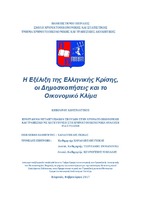Η εξέλιξη της ελληνικής κρίσης, οι δημοσκοπήσεις και το οικονομικό κλίμα

View/
Keywords
Ελληνική κρίση ; Ευρωζώνη ; Χρηματιστήρια ; Economic sentiment ; Stock returns ; Bank lending ; Current Account Balance ; Unemployment ; Euro Economic SentimentAbstract
In this paper we analyze the course of the Greek crisis, considering the social, economic and political factors that have influenced and contributed to its development within a broader environment of instability, uncertainty and increased investment risk aversion. The time horizon of the analysis is eighteen years, and extends from the beginning of 1999 up to today. We divide this interval into five sub-periods: Beginning of 1999 to December 2006, which was characterized by rapid growth of the Greek economy and joining the E.M.U , January 2007 to September 2009 with the outbreak of the international Crisis , October 2009 to June 2012, which was marked by changes in governing the country twice and signature of both the Economic Adjustment Programmes, July 2012 to December 2014, with the formation of universal government and implementation of the second Memorandum and finally January 2015 up to today, where we notice again change in power, and signature of the third Memorandum. We approach the configuration of the economic climate, with the Economic Sentiment Indicator Index, using as independent variables the Athens Stock Exchange Index, the progression of Bank lending to individuals and businesses, Unemployment’s evolution , the image of the Current Account Βalance and Euro zone's Economic Sentiment. We notice statistical importance in the relations of the Greek Economic Sentiment with the Stock Exchange, the Bank Lending, the Current Account Balance and the Unemployment in the period 2007-2009 but also in the period 2015-2017 except for the Current Account Balance. We also observe a statistically important relation between the Greek Economic Sentiment and Euro zone's the first period of our analysis, a fact that is not consistent in the next periods.


